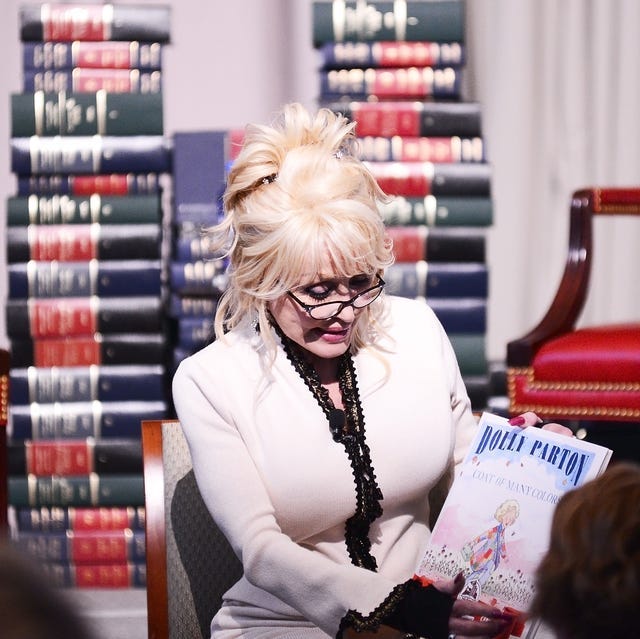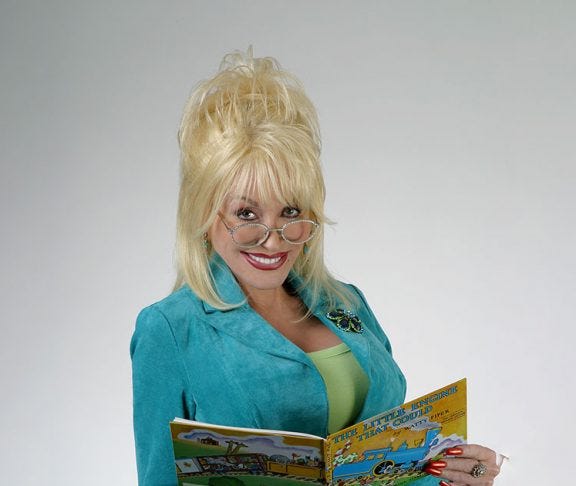When we think of educational technology (ed-tech) pioneers, we might picture Silicon Valley entrepreneurs or academic researchers. However, one of the most influential figures in democratizing education through systematic distribution of learning materials comes from an unexpected background: country music legend Dolly Parton. Her journey into ed-tech began with traditional programs but has evolved to incorporate increasingly sophisticated digital solutions, making her an unexpected but influential figure in the field.
Parton's educational initiatives began with the Dollywood Foundation in 1988, initially focused on decreasing high school dropout rates in her home county. This was followed by The Buddy Program in 1991, which used a simple but effective contract system to reduce dropout rates from over 30% to just 6%. However, it was through her Imagination Library program, launched in 1995, that Parton essentially created a prototype for many core concepts that would later become fundamental to modern ed-tech.

The Birth of a Scalable Educational Platform
Long before terms like "scalable infrastructure" became buzzwords in the tech industry, Parton implemented a remarkably scalable system for educational content distribution. The Imagination Library began in Sevier County, Tennessee, with the modest goal of providing books to local children. However, the program's carefully designed infrastructure – including partnerships with publishers, postal services, and local communities – allowed it to expand rapidly. Today, the program spans five countries and has distributed over 150 million books, using sophisticated technology to manage its global distribution network. This scalability mirrors the cloud-based platforms of today's ed-tech companies, which can quickly grow from serving hundreds to millions of users.
Personalized Learning Before AI
Modern ed-tech platforms pride themselves on using artificial intelligence to deliver personalized learning experiences. Yet Parton's program implemented a form of personalization decades earlier. The Imagination Library doesn't simply send the same books to all children; instead, it provides age-appropriate materials calibrated to each child's developmental stage, from birth to age five. This systematic approach to personalized content delivery predated adaptive learning algorithms but achieved similar goals: meeting learners where they are and providing relevant, engaging materials.
Democratizing Access to Education
Perhaps most significantly, Parton's vision aligned perfectly with what would become a central tenet of ed-tech: democratizing access to learning resources. The Imagination Library removes traditional barriers to education – cost, location, and access to transportation – by delivering books directly to children's homes at no cost to families. This model preceded but parallels how digital platforms would later use internet connectivity to reach learners in remote or underserved areas.

The Home Learning Revolution
Parton's emphasis on home-based learning proved particularly prescient. By sending educational materials directly to homes, she recognized that learning isn't confined to traditional classroom settings. This approach anticipated the remote learning revolution by decades. While ed-tech platforms would later use digital tools to facilitate home learning, Parton's program demonstrated that the core concept – empowering families to engage in education outside institutional settings – could work at scale.
The program's focus on parental engagement also foreshadowed modern ed-tech's emphasis on involving caregivers in the learning process. By providing physical books, Parton's initiative created opportunities for parent-child interaction that many digital platforms now try to replicate through parent portals and family engagement features.
Data-Driven Impact
Like modern ed-tech platforms, the Imagination Library incorporates data collection and analysis to measure impact and improve effectiveness. The program tracks registration numbers, distribution patterns, and literacy outcomes, using this information to refine book selections and expand strategically. This data-driven approach to educational improvement mirrors the analytics-based decision-making common in today's digital learning platforms.
The Begin Bright Program: A New Chapter in Digital Learning
In December 2024, Parton made a significant leap into modern ed-tech with a $4.5 million donation to launch the Begin Bright program. This initiative represents her most technology-focused educational solution to date, focusing on enhancing early childhood literacy for children preparing to start kindergarten. The program includes the development of a new app that will provide on-demand digital early literacy training, demonstrating Parton's commitment to evolving her educational initiatives alongside technological advancement.
Building Community Through Education
While many digital platforms struggle to create genuine community engagement, Parton's program naturally fosters community connections through its local affiliate model. Each participating community must have a local champion who helps implement the program, creating a network of educational advocates that strengthens program effectiveness. This hybrid model of centralized resources with local implementation offers lessons for modern ed-tech initiatives about balancing scale with community engagement.
Lessons for Modern Ed-Tech
Examining the Imagination Library through an ed-tech lens reveals several principles that remain relevant:
Simple, consistent delivery mechanisms can be more effective than complex technological solutions
Physical and emotional engagement in learning matters as much as content delivery
Local community involvement strengthens educational initiatives
Removing access barriers is crucial for educational equity
Systematic, age-appropriate content curation can achieve personalization without advanced algorithms
The Evolution of a Vision
Parton's journey into ed-tech represents a remarkable evolution, from traditional educational programs to increasingly sophisticated digital solutions. This progression can be traced through several key phases:
The Dollywood Foundation (1988): Her initial focus on reducing local dropout rates through traditional means
The Buddy Program (1991): Using simple but effective contract systems to achieve dramatic improvements in student retention
The Imagination Library (1995): Combining physical book distribution with technological infrastructure for global reach
The Begin Bright Program (2024): A full embrace of digital solutions for early childhood education
This evolution demonstrates not just her commitment to education, but her ability to adapt her approaches to leverage new possibilities while maintaining her core mission of expanding access to education.
From Country Music to Code: Dolly's Educational Legacy
While Dolly Parton didn't set out to create an ed-tech platform, her Imagination Library embodied many principles that would become central to ed-tech: scalability, personalization, accessibility, and data-driven improvement. As modern ed-tech continues to evolve, Parton's program reminds us that the fundamental goals of ed-tech – expanding access to learning and improving educational outcomes – can be achieved through thoughtful system design, even without sophisticated digital tools.
Her success also suggests that perhaps the future of ed-tech lies not in choosing between digital and physical delivery methods, but in combining them effectively. As education continues to evolve, Parton's model of combining systematic distribution, community engagement, and personalized learning remains remarkably relevant. In many ways, she didn't just anticipate the ed-tech revolution – she helped shape its most human-centered principles.
Notes
Dollywood Foundation (1988)
Dollywood Foundation. The History and Impact of the Imagination Library. Sevierville, TN: Dollywood Foundation Press, 2018.
U.S. Department of Education. “Data-Driven Practices in Early Literacy Programs.” 2023, www.ed.gov/literacy-reports.
The Buddy Program (1991)
Tennessee Department of Education. "The Buddy Program: Case Study on Dropout Prevention." 1996 Report Archive.
Miller, Patricia A. "Local Engagement in National Literacy Programs: Lessons from the Imagination Library." Community Literacy Journal, vol. 5, no. 2, 2015, pp. 50-67.
Imagination Library (1995)
Anderson, Sarah. “Dolly Parton’s Imagination Library Reaches 150 Million Books Distributed.” NPR, 12 June 2022, www.npr.org/articles/dolly-parton-literacy-program.
Hall, Doug. "Analyzing the Impact of the Imagination Library on Early Childhood Literacy Development." Journal of Educational Policy and Innovation, vol. 12, no. 3, 2017, pp. 198-214.
Dollywood Foundation. "Imagination Library: Global Literacy Initiative." Accessed January 2025. www.imaginationlibrary.com.
Begin Bright Program (2024)
Goldstein, Nicole. “Begin Bright: Dolly Parton’s Digital Leap into Educational Technology.” EdTech Today, 15 Dec. 2024, www.edtechtoday.com/articles/begin-bright-launch.
Begin Bright Program Official Website. "Early Literacy for a Brighter Future." Accessed January 2025. www.beginbright.org.
at this electric juncture in my life, i'm committing to 30 days of micro-essays – a variation of my earlier ‘50 days of writing’ from 2023. while most pieces will be personal reflections mapping this transformative period, others will explore and crystallize ideas surrounding my company. writing, after all, has always been my way of making sense of pivotal moments.
you can follow along in two ways: subscribe to this substack to receive each micro-essay as it's born, landing directly in your inbox. or, if you prefer a weekly rhythm, these pieces will find their way into my newsletter – a consolidated journey of the week's thoughts, revelations and musings. your choice, your rhythm.






